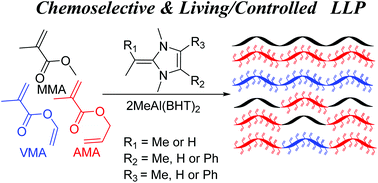Chemoselective and living/controlled polymerization of polar divinyl monomers by N-heterocyclic olefin based classical and frustrated Lewis pairs†
Abstract
Living and controlled polymerization of conjugated polar alkenes including methyl methacrylate (MMA) and polar divinyl monomers such as allyl methacrylate (AMA) and vinyl methacrylate (VMA) has been achieved at room temperature (RT) by Lewis pairs (LPs) using a strong nucleophilic N-heterocyclic olefin (NHO) as a Lewis base (LB) and a sterically encumbered, but modestly strong Lewis acid (LA), MeAl(4-Me-2,6-tBu2-C6H2O)2 (MeAl(BHT)2). Both classical and frustrated Lewis pairs (LPs) exhibited not only comparable polymerization activity and a high degree of control over the molecular weight (MW) and molecular weight distribution (MWD) of polymers, but also excellent chemoselectivity towards the polymerization of the conjugated acrylic double bond in polar divinyl monomers, leaving the pendant C![[double bond, length as m-dash]](https://www.rsc.org/images/entities/char_e001.gif) C bond unreacted. By strictly controlling the time for the addition of co-monomers, the well-defined diblock copolymers (PMMA-b-PAMA, PAMA-b-PMMA and PAMA-b-PVMA) and triblock copolymers (PMMA-b-PAMA-b-PMMA, PAMA-b-PMMA-b-PAMA and PAMA-b-PVMA-b-PAMA) could be successfully synthesized through the sequential block copolymerization method.
C bond unreacted. By strictly controlling the time for the addition of co-monomers, the well-defined diblock copolymers (PMMA-b-PAMA, PAMA-b-PMMA and PAMA-b-PVMA) and triblock copolymers (PMMA-b-PAMA-b-PMMA, PAMA-b-PMMA-b-PAMA and PAMA-b-PVMA-b-PAMA) could be successfully synthesized through the sequential block copolymerization method.



 Please wait while we load your content...
Please wait while we load your content...